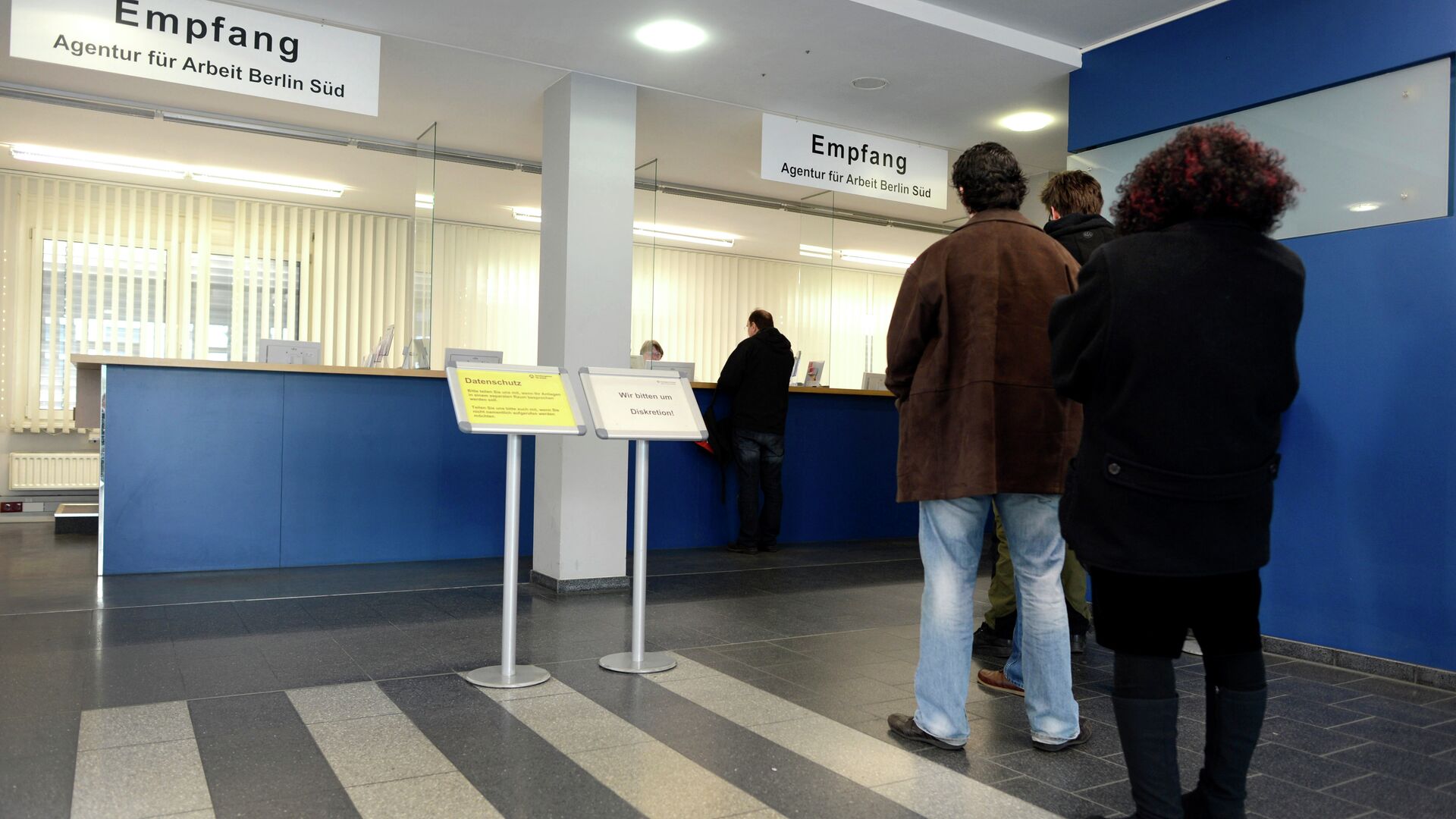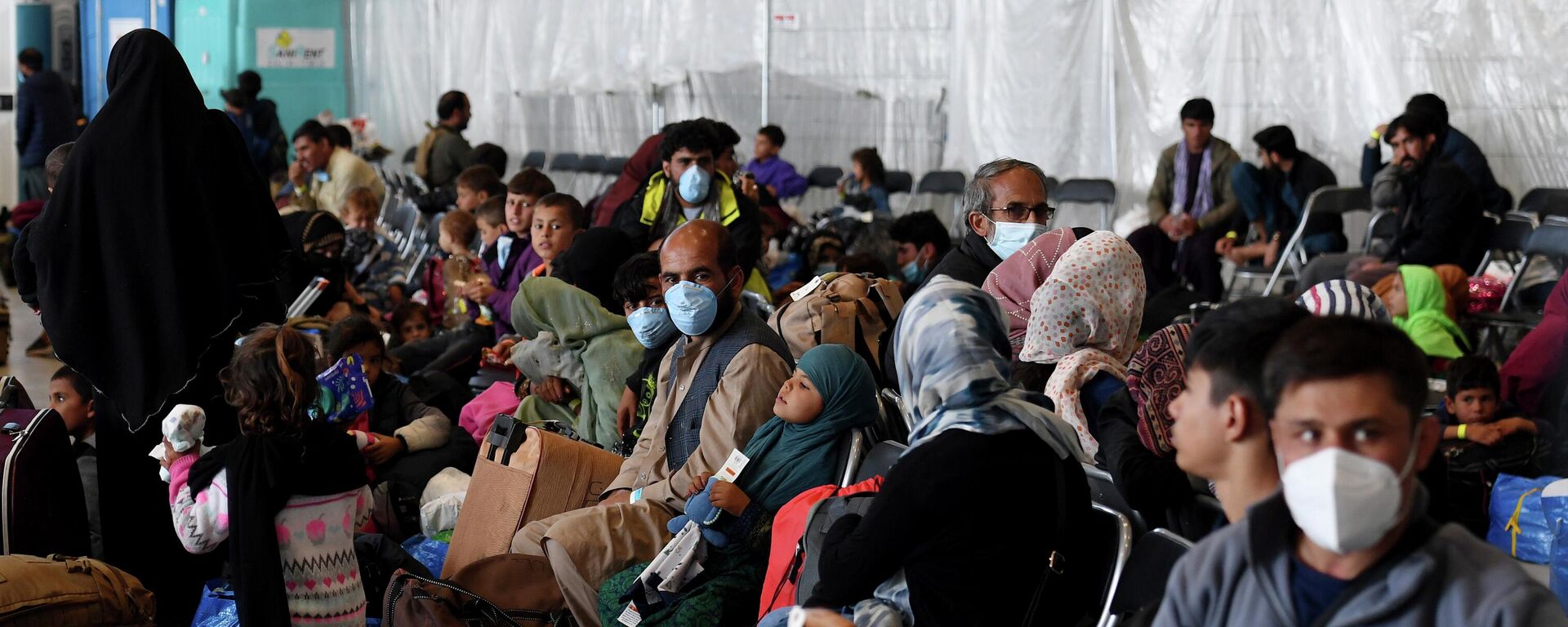https://sputnikglobe.com/20220831/germany-sees-unemployment-uptick-of-55-in-august-as-more-ukraine-refugees-flood-labour-market-1100224687.html
Germany Sees Unemployment Uptick of 5.5% in August as More Ukraine Refugees Flood Labour Market
Germany Sees Unemployment Uptick of 5.5% in August as More Ukraine Refugees Flood Labour Market
Sputnik International
Hundreds of thousands of Ukrainian refugees made a beeline for Germany since the beginning of the Ukraine crisis. They were promised access to housing and... 31.08.2022, Sputnik International
2022-08-31T12:31+0000
2022-08-31T12:31+0000
2022-08-31T12:31+0000
world
europe
germany
ukraine crisis
refugees
https://cdn1.img.sputnikglobe.com/img/102362/98/1023629864_0:177:4791:2872_1920x0_80_0_0_871cc23d51730ceb258813c10b6236da.jpg
The unemployment rate surged in Germany in August after more refugees fleeing the crisis in Ukraine joined the workforce, according to data from the Federal Employment Agency released on August 31.Joblessness rose to 5.5% in August, in a slight uptick from 5.4% in July. The number of people out of work rose by 28,000 during the month, according to the Federal Labor Office, with 887,000 registered job vacancies. Thus, the overall unemployment stands at 2.497M.Germany has been one of the leaders in accepting Ukrainian refugees in the EU amid Russia’s ongoing special military operation in Ukraine, second only to Poland.Under a European Union directive, refugees from Ukraine were granted protection status in the EU for up to three years, besides access to health insurance and the labor market.So far, it has registered an influx of close to a million people from Ukraine, according to latest data provided by the United Nations Refugee Agency. A large majority are women, many traveling with children, according to surveys. However, problems with educational levels and language skills have made finding employment for them challenging, according to Munich-based economics research institute ifo (Information and Forschung (research).Statistical rise in joblessness notwithstanding, according to Germany’s Federal Employment Agency, demand for workers has persisted in the country after coronavirus restrictions were lifted.The outlook offered earlier in the month by a S&P Global survey was less hopeful. It indicated that job creation was starting to grow more sluggish due to uncertainty over the bleak economic outlook.Germany, leading the pack in terms of self-inflicted economic woes from the six packages of sanctions set in place by the EU against Russia, has been predicted by economists to slip into recession.Restrictions by Brussels and individual European Union countries and their allies against Russian energy imports as part of the sweeping sanctions campaign targeting Moscow have resulted in an unprecedented energy crisis.The US-led drive to “punish” Russia for its military operation in Ukraine backfired on the European Union, leaving the bloc facing heightened energy prices coupled with rising inflation after Brussels joined Washington in attempting to “phase out” Russian oil, coal and gas.Nations across the EU have been taking emergency measures to reduce energy consumption.In Germany, inflation reached 7.5 percent in July, with energy prices expected to skyrocket in the lead-up to winter. The German government has taken measures to fill gas storage facilities in order to reduce gas consumption. The government greenlighted hard coal-fired power plants to operate again to reduce the nation's dependence on Russian natural gas. Furthermore, the chairman of the federal food bank umbrella organization Tafel Deutschland, Jochen Brühl, warned in July that the food charities would be unable to cope with the record high numbers of customers forced to seek free food services.
https://sputnikglobe.com/20220422/germany-boots-out-scores-of-afghans-amid-influx-of-ukrainian-refugees-report-says-1094973705.html
https://sputnikglobe.com/20220812/explosive-mood-germany-expects-winter-of-fury-amid-energy-crisis-and-soaring-inflation-1099510083.html
https://sputnikglobe.com/20220831/europes-energy-crisis-will-cost-lives-this-winter-1100198335.html
germany
Sputnik International
feedback@sputniknews.com
+74956456601
MIA „Rosiya Segodnya“
2022
News
en_EN
Sputnik International
feedback@sputniknews.com
+74956456601
MIA „Rosiya Segodnya“
Sputnik International
feedback@sputniknews.com
+74956456601
MIA „Rosiya Segodnya“
europe, germany, ukraine crisis, refugees
europe, germany, ukraine crisis, refugees
Germany Sees Unemployment Uptick of 5.5% in August as More Ukraine Refugees Flood Labour Market
Hundreds of thousands of Ukrainian refugees made a beeline for Germany since the beginning of the Ukraine crisis. They were promised access to housing and financial support, but their job prospects have been uncertain amid issues with qualifications or language skills.
The unemployment rate surged in Germany in August after more refugees fleeing the
crisis in Ukraine joined the workforce, according to data from the Federal Employment Agency released on August 31.
Joblessness rose to 5.5% in August, in a slight uptick from 5.4% in July. The number of people out of work rose by 28,000 during the month, according to the Federal Labor Office, with 887,000 registered job vacancies. Thus, the overall unemployment stands at 2.497M.
“Despite the economic and political uncertainties, the labor market is robust. Unemployment and underemployment increased again more strongly in August than is usual for the time of year. However, this is still due to the registration of Ukrainian refugees,” Andrea Nahles, Federal Employment Agency (BA) chief, said in a statement.
Germany has been one of the leaders in accepting Ukrainian refugees in the EU amid Russia’s ongoing
special military operation in Ukraine, second only to Poland.
Under a European Union directive, refugees from Ukraine were granted protection status in the EU for up to three years, besides access to health insurance and the labor market.
So far, it has registered an influx of close to a million people from Ukraine, according to latest data provided by the United Nations Refugee Agency. A large majority are women, many traveling with children, according to surveys. However, problems with educational levels and language skills have made finding employment for them challenging, according to Munich-based economics research institute ifo (Information and Forschung (research).
Statistical rise in joblessness notwithstanding, according to Germany’s Federal Employment Agency, demand for workers has persisted in the country after coronavirus restrictions were lifted.
The outlook offered earlier in the month by a S&P Global survey was less hopeful. It indicated that job creation was starting to grow more sluggish due to uncertainty over the
bleak economic outlook.
Germany, leading the pack in terms of
self-inflicted economic woes from the six packages of sanctions set in place by the EU against Russia, has been predicted by economists to slip into recession.

12 August 2022, 10:49 GMT
Restrictions by Brussels and individual European Union countries and their allies against Russian energy imports as part of the sweeping sanctions campaign targeting Moscow have resulted in an unprecedented energy crisis.
The US-led drive to “punish” Russia for its military operation in Ukraine backfired on the European Union, leaving the bloc facing heightened energy prices coupled with rising inflation after Brussels joined Washington in attempting to “phase out” Russian oil, coal and gas.
Nations across the EU have been taking emergency measures
to reduce energy consumption.
In Germany, inflation reached 7.5 percent in July, with energy prices expected to skyrocket in the lead-up to winter. The German government has taken measures to fill gas storage facilities in order to reduce gas consumption. The government greenlighted hard coal-fired power plants to operate again to reduce the nation's dependence on Russian natural gas. Furthermore, the chairman of the federal food bank umbrella organization Tafel Deutschland, Jochen Brühl, warned in July that the
food charities would be unable to cope with the record high numbers of customers forced to seek free food services.

31 August 2022, 09:58 GMT







